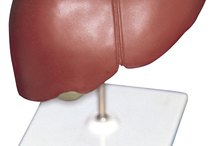What does fact checked mean?
At Healthfully, we strive to deliver objective content that is accurate and up-to-date. Our team periodically reviews articles in order to ensure content quality. The sources cited below consist of evidence from peer-reviewed journals, prominent medical organizations, academic associations, and government data.
The information contained on this site is for informational purposes only, and should not be used as a substitute for the advice of a professional health care provider. Please check with the appropriate physician regarding health questions and concerns. Although we strive to deliver accurate and up-to-date information, no guarantee to that effect is made.
Can Laxative Abuse Cause an Iron Deficiency?
Iron is an essential mineral needed to carry oxygen through your red blood cells to every organ and cell in your body. It also is involved in producing energy. Anemia is one of the most common side effects of iron deficiency that can lead to weakness and fatigue. Poor diet, blood loss, trauma and surgery can lead to an iron deficiency. Anemia from laxative abuse can cause an iron deficiency.
Uses
A wide range of laxatives are available over the counter to help you trigger a bowel movement by softening your stool or draw fluid into your bowels to create healthy stools. According to Family Doctor.org, harsh laxatives that contain stimulants cause your bowels to contract and squeeze out the stools 2. Occasional laxative use usually doesn't have consequences, but long-term use can create a host of complications, including anemia and vitamin deficiencies. Even natural laxatives like mineral oil or castor oil can cause medical problems.
- A wide range of laxatives are available over the counter to help you trigger a bowel movement by softening your stool or draw fluid into your bowels to create healthy stools.
- According to Family Doctor.org, harsh laxatives that contain stimulants cause your bowels to contract and squeeze out the stools 2.
Consequences
Vitamin Deficiencies With Laxatives & Diuretics
Learn More
When laxatives are used to rid your body of food quickly after eating, the nutrients that you ingested do not have time to go through the natural absorption process and you end up with a slew of deficiencies. Additionally, according to the Eating Disorder Referral and Information Center, excessive laxative use can cause tears in your esophagus and create ruptures in your intestines and bowels that leads to blood loss and iron deficiencies 1.
Causes
The most common cause of anemia is iron deficiency, according to the University of Maryland Medical Center 3. Red blood cells contain hemoglobin, which is an iron-based protein necessary to carry oxygen through your blood cells. When your body can't produce enough red blood cells or you lose iron faster than your body can absorb it by using laxatives, you develop anemia. While blood cells, needed to fight infection and platelets, required for clotting, also require sufficient nutrients to function properly.
- The most common cause of anemia is iron deficiency, according to the University of Maryland Medical Center 3.
- When your body can't produce enough red blood cells or you lose iron faster than your body can absorb it by using laxatives, you develop anemia.
Side Effects
Does Iron Deficiency Cause Headaches?
Learn More
When you have an iron deficiency, at first you may feel tired and weak, with intermittent heart palpitations. You will then get dizzy and even faint from the lack of iron in your blood. Headaches and leg pain may develop and you may experience angina, or chest pain, as the condition progresses. Long-term iron deficiency leads to brittle hair, difficulty swallowing, sores in your mouth and an altered state of touch. You will most likely develop dry mouth and a burning sensation on your tongue.
- When you have an iron deficiency, at first you may feel tired and weak, with intermittent heart palpitations.
- Headaches and leg pain may develop and you may experience angina, or chest pain, as the condition progresses.
Treatment
The first line of treatment is to stop taking laxatives and allow your food to provide your body with necessary nutrients. You may need iron supplements as well. Glycerate, sulfate and ferrous fumarate are forms of iron that are absorbed easily in the body and can help relieve the deficiency. Talk to your doctor before taking iron supplements, however, and make sure your doctor knows about your laxative abuse in case you need other kinds of medical tests or psychological counseling. Besides liver, effective dietary sources of iron can include oysters, poultry and lean red meat. Beans, seeds and whole grains are good sources as well, especially when eaten with foods high in vitamin C like berries and broccoli.
- The first line of treatment is to stop taking laxatives and allow your food to provide your body with necessary nutrients.
- Besides liver, effective dietary sources of iron can include oysters, poultry and lean red meat.
Related Articles
References
- Eating Disorder Referral and Information Center: Consequences of Eating Disorders
- Family Doctor.org: Laxatives
- University of Maryland Medical Center: Anemia
- Camaschella C. Iron deficiency: new insights into diagnosis and treatment. Hematology Am Soc Hematol Educ Program. 2015;2015:8-13. doi:10.1182/asheducation-2015.1.8
- Pawlak R, Berger J, Hines I. Iron Status of Vegetarian Adults: A Review of Literature. Am J Lifestyle Med. 2016;12(6):486–498. doi:10.1177/1559827616682933
- DRI: Dietary Reference Intakes for Vitamin A, Vitamin K, Arsenic, Boron, Chromium, Copper, Iodine, Iron, Manganese, Molybdenum, Nickel, Silicon, Vanadium, and Zinc. Washington, D.C.: National Academy Press; 2001.
- Alaunyte I, Stojceska V, Plunkett A. Iron and the female athlete: a review of dietary treatment methods for improving iron status and exercise performance. J Int Soc Sports Nutr. 2015;12:38. doi:10.1186/s12970-015-0099-2
- Mirza FG, Abdul-kadir R, Breymann C, Fraser IS, Taher A. Impact and management of iron deficiency and iron deficiency anemia in women's health. Expert Rev Hematol. 2018;11(9):727-736. doi:10.1080/17474086.2018.1502081
- Hegazy AA, Zaher MM, Abd El-Hafez MA, Morsy AA, Saleh RA. Relation between anemia and blood levels of lead, copper, zinc and iron among children. BMC Res Notes. 2010;3:133. Published 2010 May 12. doi:10.1186/1756-0500-3-133
- Qin Y, Melse-Boonstra A, Pan X, et al. Anemia in relation to body mass index and waist circumference among Chinese women. Nutr J. 2013;12:10. doi:10.1186/1475-2891-12-10
- Cleveland Clinic. Leukemia. Updated October 31, 2016.
- Merck Manual Professional Version. Iron Deficiency Anemia. Updated July 2018.
- Johns Hopkins Hospital. Iron-Deficiency Anemia.
- Abu-Ouf NM, Jan MM. The impact of maternal iron deficiency and iron deficiency anemia on child's health. Saudi Med J. 2015;36(2):146–149. doi:10.15537/smj.2015.2.10289
- National Institute of Diabetes and Digestive and Kidney Diseases. Hemochromatosis. Updated March 2014.
Writer Bio
Linda Ray is an award-winning journalist with more than 20 years reporting experience. She's covered business for newspapers and magazines, including the "Greenville News," "Success Magazine" and "American City Business Journals." Ray holds a journalism degree and teaches writing, career development and an FDIC course called "Money Smart."









